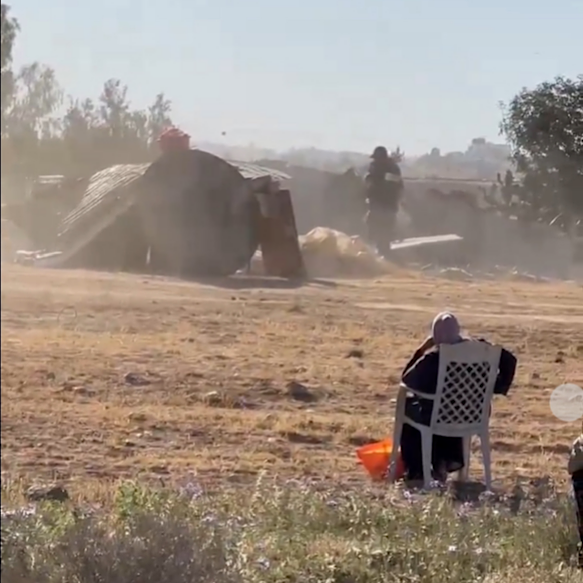Despite the war, Israel tears down Bedouin homes, other victims of Hamas
About 50 homes in a village in the Negev have been razed to the ground, leaving hundreds of people homeless in one of the largest mass demolitions in recent years. For Ben Gvir, the homes were “illegal” and destroying them “an important step”. For the community, “We've sought a solution for years, hoping for a fair resolution.”
Jerusalem (AsiaNews) – Israeli authorities ordered the demolition of scores of houses, one of the largest in recent years.
At least 50 homes owned by members of a Bedouin community in the Negev desert were torn down because they were branded as "illegal" by National Security Minister Itamar Ben Gvir, a a staunch supporter of Israelin settlements and outposts in the occupied territories.
Bulldozers razed buildings Wadi al-Khalil, triggering anger and frustration among residents of the village of some 500 people.
Some of the people who lost their homes have relatives who died in the Hamas terrorist attack on Israel on 7 October that triggered the brutal war in Gaza.
Moreover, the one person who was seriously hurt from Iran’s missile and drone attack against the Jewish state is a Bedouin girl, seven-year-old Amina al-Hasoni, a case that quickly fell off the radar of foreign government and media.
The demolition highlights how some Israeli citizens have more rights than others. Indeed, the country’s Bedouin community – like migrants from Asia – are largely invisible and forgotten victims of the devastating conflict that is taking place in the Middle East.
The demolitions, near Umm Butin village, targeted the houses of members of the same family, Abu Asa, leaving hundreds of them without a home.
The Israeli authorities demolished the houses on the grounds that they did not have the proper building permits, which are very rarely granted to Palestinian Bedouins in the Negev desert, known as Naqab in Arabic.
Several Abu Asa family members chose to set fire to their own homes rather than watch helplessly Israeli buldozers demolish them. Another, Ahmed Abu Asa, was arrested for trying to stop the bulldozers.
Kayed Abu Latif, a farmer and agricultural studies researcher, said the demolition order was "surprising," especially since local Israeli-Palestinians helped Israelis during Hamas’s attack on southern Israel in October.
“There are more than 500 people here. (Now) the children and the women have nowhere else to go," lamented one resident, Sleiman Abu Asa.
“They are demolishing our homes, leaving us stranded outside," he added as police were deployed to monitor the operation. “We don't deserve this. We've sought a solution for years, hoping for a fair resolution, yet the state has obstructed all our options.”
However, for Security Minister Itamar Ben Gvir, a right-wing extremist who is pushing hard to expand Israeli settlements on Palestinian lands, the Wadi al-Khalil homes are "illegal constructions”.
Warning anyone who "violates the law in the Negev", he noted that the demolition was "an important step", a sign that the government would not tolerate any challenge to its authority.
“The police will fight anyone who seizes land and tries to build another reality on the ground,” Ben Gvir added.
Before Israel's creation in 1948, the Negev Desert was home to about 92,000 Bedouins, but only 11,000 remained within Israel's borders after the first Arab-Israeli War (1948-1949).
Among those who stayed behind, many live in unrecognised settlements, without planning and basic services such as running water, sewage, and electricity.
Very few have access to bomb or missile shelters, and most refuse to be resettled and therefore face great hardships in Israeli society.
Today they number around 300,000, half of whom living in cities and half in informal villages not recognised by the state.
The government left “children and women homeless,” said Arab Israeli activist Taleb el-Sana.
"An entire village was wiped out just because its inhabitants are Arab" and "under the pretext of unlicensed construction", he said.
For Sana, Israel “doesn't allow (Bedouin) citizens to obtain building permits;” yet, it “demolishes their homes under the pretext of a lack of permits”.
For Abu Asa, “We don't deserve this”.
14/05/2024 18:57
29/03/2023 21:33







.png)










